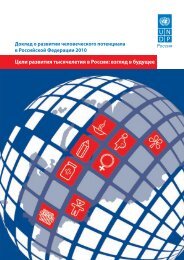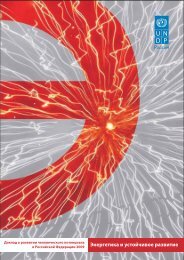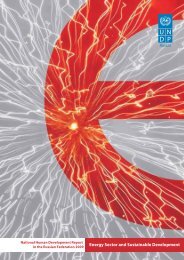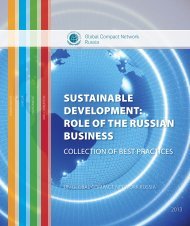Report - UNDP Russia
Report - UNDP Russia
Report - UNDP Russia
Create successful ePaper yourself
Turn your PDF publications into a flip-book with our unique Google optimized e-Paper software.
Chapter 1The Energy Sector,the Economy and the Crisis1.1. The energy sectorand human developmentHuman development is only possible ifenergy needs are met to a sufficient extent. Sothe acute problems, which the internationalenergy industry is facing today, must be ofconcern to the global community. <strong>Russia</strong> has aspecial role to play in this context, because it hasboth enormous human potential and vast energyresources. The country’s comparative wealth innatural resources has made it one of the world’sleading suppliers of energy. This role also hasspecific impact on human development trendsinside <strong>Russia</strong>.It is a characteristic feature of the worldenergy system at its current stage ofdevelopment that centers of production andconsumption do not coincide geographically.Formation of energy markets in the 20 th centuryboth at the level of macro-regions and on aglobal level played an important role in theeconomic growth of developed countries and ofsome developing countries. The formation ofglobal markets greatly reduced the limitations,which developed countries would face, if theyhad to meet their huge energy requirementsfrom their own resources.Functioning of energy markets mightcause a move towards an optimum in terms of aglobal economic equilibrium, but this has led toa number of externalities, which have complexand often unforeseen implications forsustainable development of the world economyand for human development.Firstly, disproportions in global energyconsumption promote global inequality. At thebeginning of the third millennium developedcountries produce less than one third of theworld’s primary energy, while consuming almosthalf of it. In 1991–2008 average per capitaconsumption of primary energy in OECDcountries was three times higher than the worldaverage, and that gap had widened incomparison with the preceding two decades.The economies of power supplyingcountries are accordingly becoming more andmore specialized in the world division of labor.Experience shows that such orientation slowsdown diversification of national economies andcan lead to a slowdown of economic growth inthe long run. The mechanisms of this ‘paradox ofabundance’ or ‘resource curse’ are describedfurther on, and they can have impact on humandevelopment by reducing motivation forinvestments in human resources, raising socialtension, and holding back real growth ofpersonal incomes.Secondly, there are even more seriousimbalances in production and consumption ofhydrocarbons. The problem of energy poverty isnot being dealt with quickly enough. Supply ofenergy (fuels and energy infrastructure) to lowincomecountries remains unsatisfactory, stallingindustrial development and therefore hinderinggrowth of real personal incomes. Africa remains anet exporter of energy resources even thoughper capita energy consumption on the continentis extremely low (three times lower than theworld average). Lack of available energy reducesthe quality and quantity of collective goods,including education and health care.Thirdly, existence of low-cost energyresources (compared with alternative energytechnologies), which do not carry additionalcosts associated with environmental and healthhazards, postpones technology breakthroughs inthe world energy industry, as was seen in1986–2002. This preserves the socially nonoptimalstructure of energy consumption and, asa consequence, non-optimum production andconsumption of goods and services. Scientificprogress and its commercial application toenergy saving are slowed down as a result.Fourthly, both exporters and importers ofenergy face large-scale problems associated withenergy security. Fuel importing countries dependon supplies from regions of the world, whichsometimes lack political stability. Delivery routesbecome longer. Large-scale energy pricedeviations create serious problems for exporters(for their sustainability, well-being andinvestments). These factors create a threat oftemporary external shocks for developed13












